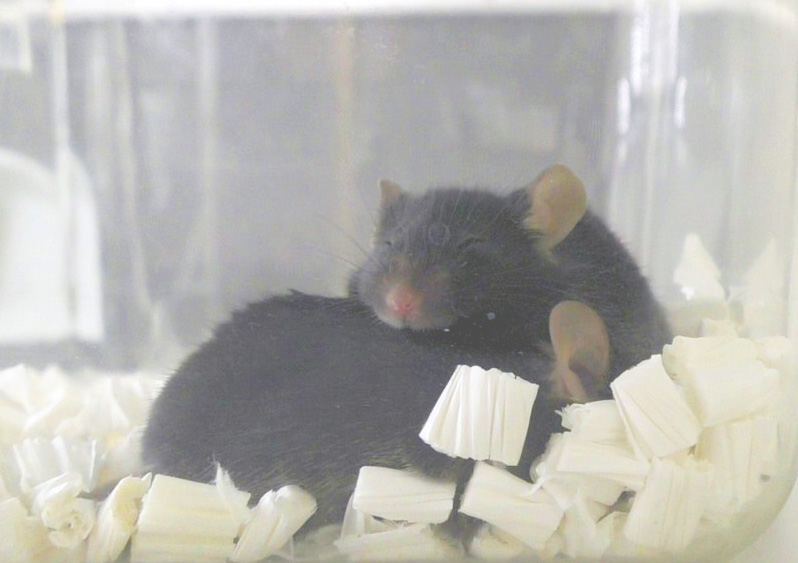DATE2023.01.31 #FEATURES#The Rigakubu News
Mysteries in Science(Vol. 19): Why do sleep-deprived rats die?

Why do sleep-deprived rats die?
Yu Hayashi (Professor, Department of Biological Sciences)
Many of us have experienced the surprisingly invigorating feeling that comes from simply taking a short nap when we are feeling unbearably fatigued. Surprisingly, however, the mechanisms by which sleep helps the body recover are still poorly understood.
In an attempt to elucidate the role of sleep, sleep deprivation experiments, where sleep is deprived by coercively waking up animals at the moment they fall asleep, have been conducted in various animal species. However, these experiments must be interpreted with caution. Animals that have been deprived of sleep for so long that they become sleepy cannot be awakened by minor stimuli. In other words, the longer a sleep deprivation experiment is run, the more stimulation is required to wake the animals, and the effect of the stimulation itself cannot be ignored. In a study published in Science in 1983, the authors considered this point and designed an experimental method so that whenever an individual of a large rodent (rat) fell asleep, the same stimulus was given to both the sleep-deprived individual and a control (not sleep-deprived) individual kept on the opposite side of the cage wall. This allowed the researchers to provide the same stimuli under both conditions. Despite being given the same stimuli, the amount of sleep in the sleep-deprived animals decreased to about 10%, while that of the controls decreased only to about 70%.
What were the differences between the sleep-deprived and control individuals at the end of this experiment? Firstly, only the sleep-deprived individuals died within 2 to 3 weeks. Moreover, the sleep-deprived individuals lost weight and their body temperature decreased, despite a significant increase in food intake toward the end of the experiment. This implies that their energy consumption increased significantly. In addition, skin damage was observed in areas not covered by fur. Surprisingly, there was no difference in the levels of corticosteroids, hormones thought to be markers of stress. So, did the increased energy consumption and loss of body heat cause the death of the sleep-deprived animals? Energy expenditure is controlled by the thyroid gland. When the thyroid function was decreased in the sleep-deprived individuals, energy consumption decreased and body temperature decreased further, but there was no effect on the time of death. Quite the opposite, when the thyroid gland function was artificially increased, it prevented the decrease in body temperature, but hastened the time of death. Therefore, there may be no direct relationship between energy consumption, temperature decrease, and death due to sleep deprivation. Upon examination of blood samples and some organs of the sleep-deprived individuals, researchers found that they were infected with bacteria in amounts higher than normally detected. This suggested that the immune system was weakened, resulting in the abnormal proliferation and spread of commensal, e.g., intestinal, bacteria. However, it was also found that suppressing the bacteria’s growth by giving antibiotic cocktails to sleep-deprived individuals did not affect mortality. Thus, although the involvement of other pathogens such as viruses cannot be ruled out, there was no direct evidence that infection was the cause of death. It has been almost 40 years since the first sleep deprivation experiments were conducted, yet the cause of death in sleeping rats is still unknown.
Both rats and humans have two types, REM and non-REM, sleep. REM sleep is commonly known as “dream sleep,” because people awakened during REM sleep report that they were dreaming. On the other hand, non-REM sleep is generally considered important for physical recovery, as the secretion of growth hormones increases during non-REM sleep. Recently, however, the possibility has emerged that REM sleep may also be important for recovery. Recent findings show that the lack of REM sleep is a risk factor for cardiovascular disease and death from various causes. In our laboratory, we have succeeded in creating a genetically modified form of mice, in which REM sleep is almost completely eliminated. We hope to use this unique strain of the species to explore the mysteries of sleep.

Figure: A pair of mice, snuggled comfortably together, asleep. What kind of changes could be occurring inside their bodies?
― This article is from the "Mysteries in Science" series in The Rigakubu News ―


